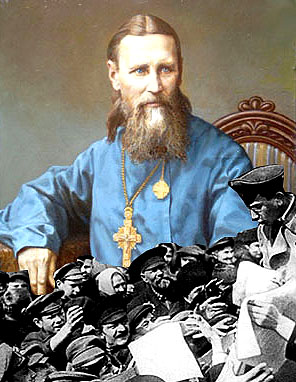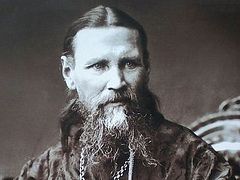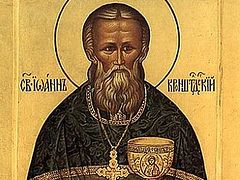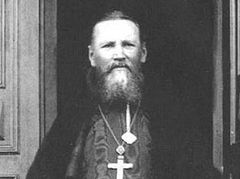 In the years when Archpriest John Ilyich Sergiyev was already well known in Russia, and the St. Andrew Cathedral in Kronstadt was filled at every Liturgy with thousands of people from all over the country, there was an outrageous incident. During the services, a certain student climbed onto the ambo and lit his cigarette from the lampada on the iconostasis. Fr. John had already come out of the altar with the chalice for Communion. He looked, perplexed, at the young man and wrathfully asked him, “What are you doing?” The young man was totally unabashed and unashamed, and was in no haste to leave the church. He walked up to Fr. John and quickly, backhanded him across the face. Fr. John rocked strongly from the blow. The Eucharistic Gifts splashed out of the chalice onto the floor, and several tiles had to be taken from the ambo to be given over to the Baltic Sea.1 The revolution was just around the corner.
In the years when Archpriest John Ilyich Sergiyev was already well known in Russia, and the St. Andrew Cathedral in Kronstadt was filled at every Liturgy with thousands of people from all over the country, there was an outrageous incident. During the services, a certain student climbed onto the ambo and lit his cigarette from the lampada on the iconostasis. Fr. John had already come out of the altar with the chalice for Communion. He looked, perplexed, at the young man and wrathfully asked him, “What are you doing?” The young man was totally unabashed and unashamed, and was in no haste to leave the church. He walked up to Fr. John and quickly, backhanded him across the face. Fr. John rocked strongly from the blow. The Eucharistic Gifts splashed out of the chalice onto the floor, and several tiles had to be taken from the ambo to be given over to the Baltic Sea.1 The revolution was just around the corner.
***
Unfortunately, the student walked out of the church on his own two feet and was not torn apart by the indignant congregation—which he deserved. I say this with full responsibility for each word, and I make no exaggeration; if the people had acted more sternly and appropriately, the audacity of the jackals would have waned before their eyes. Again I say this from the point of view of the history that followed, which is for us now the past, but which was then only a premonition not clearly discerned. Not far off were times of unprecedented blasphemy against the faith—but first, before they priests were with their epitrachelions or “communed” with molten pewter, someone had to begin with a brazen mockery of the Church, the Sacraments, and the clergy.
The ancient serpent crawled out of the earth, and his poisoned breath was to many depicting mirages of imminent universal happiness. In the name of the future they had to say good bye to the past. Blasphemy is one form of such goodbyes. In his Diary of a Writer Dostoevsky describes an incident when a simple peasant man on a bet brought Communion out of the church in his cheek in order to shoot the Holy Gifts from a rifle (!). Yes, it happened, and Esenin2 spat out Holy Communion, boasting about it to Blok.3 Apparently the same thing could be noted in Lenin’s favorite, Bukharin,4 when he was in school. Many countless baptized people ripped off their baptismal crosses with joy, and were it possible they would have “washed” away their baptism with some bloody sacrifice, as did Julian the Apostate. We have to understand that on the eve of the revolution, huge masses of people were quite demonically possessed, giving the devil a place in their hearts. For some this demonization was clothed in civic pathos, for others, in speeches to justify this pathos. The devil was characteristically ungrateful in time toward both, and devoured flesh and bone the builders of the “new world”, the destroyers of the “old”, and those who liked to contrive approving arguments for the former and the latter.
But how did that same student in Kronstadt see himself? As a hooligan? A blasphemer? No, you jest! He saw himself as a hero and expressor of social protest. Some superficial brochures helped him formulate his pitiful worldview. “You answer to me for the Inquisition, for Giordano Bruno, and for the destruction of Aztec civilization,” he perhaps muttered as he bore out his plans for revenge against the Church. A stupid man has to mutter something to himself during his pimply years, when the demon has already settled into him and is dragging him on to his work. After all, even today, in a period of universal literacy, people are still muttering the same kind of rubbish.
The student probably firmly believed—but not in the Resurrection of Christ; he believed in the triumph of progress and humanism. For the sake of one belief he insulted another, which was noticeable everywhere but not everywhere in the hearts. He insulted this faith with the intention of putting it more quickly to an end.
Then he left the church on his own two feet, and what happened to him afterwards we don’t really know. But we well know what generally happened to this great crowd of “pale youths with heated gazes”. The man who entered a church with the aim of striking a priest was unlikely to live out his life in “piety and purity”. His godless act left unpunished inevitably gave him new wings, and in many people’s eyes he became an intrepid who disdained the archaic ways. What would hinder him from throwing bombs at the gendarmes, or scribbling anti-government leaflets by night, or sharpening an axe, like a new Raskolnikov? What would forbid him from jumping into the whirlwind of struggle against sovereignty, seeking either happiness for the millions, or greater, if only momentary, glory for himself? And if he lived to February, then with tears of joy and squeals, as is characteristic of all high-strung personalities, he would welcome the emperor’s abdication. Then would come October, and if he wasn’t with the Leninist-Trotskyist Bolsheviks, he might have ended up in the midst of the equally radical Essers5—who also loved to shoot people.
Who of those who stand at the time in the St. Andrew Cathedral and remained among the living would later kill him? After all, it is highly probably that someone killed him during that insane twentieth century, when even the most innocent people were rarely vouchsafed a peaceful death in their own beds? It could have been anyone. A bullet from the White Army during the Civil War. A bullet from a Red henchman in a “Red terror” basement. The same bullet from the same henchmen, only later, when “socialism was already built”. Or perhaps he died from hunger or scurvy at the construction site of the new age, or the knife of a street criminal—at the same construction site. Or perhaps he himself put his head into the noose, seeing how unresembling reality was to what he and other demoniacs like him were fighting for (not without his participation). In that case he would have saved his homeland a bullet, although nobody would have thanked him for that.
***
But let’s transport ourselves back to the St. Andrew Cathedral in Kronstadt. The riot in the Imperial fleet has not yet happened. There has not yet been a rebellion, which Tuchachevsky6 and his comrades would run across the ice to put down with artillery fire. Gumilev7 has not yet been executed. The last Romanovs are still on the throne, and the wonderworking pastor of All Russia, Fr. John Iyich Sergiyev is serving in the church. And then some scum climbs onto the ambo and lights his cigarette from the lampada hanging before the local icon…
Tomorrow the most honored public will giggle at the news in some hot-off-the-press liberal news rag.




